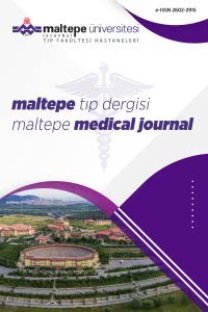Erişkin hastada intestinal invajinasyona sebep olan Meckel divertikülü
İntestinal İnvajinasyon, Meckel Divertikülü, Erişkin
Intestinal ınvagination due to Meckel's diverticulum in an adult patient
Intestinal Invagination, Meckels Diverticulum, Adult,
___
- 1. Park JJ, Wolff BG, Tollefson MK, at al. Meckel’s Diverticulum. Ann Surg 2005 ;241(3):529-33.
- 2. Meckel JF. Uber die divertikel am darmkanal. Arch Physiol 1809;9(1):421-53.
- 3. Citgez B, Yetkin G, Uludağ M, et al. A rare combination of intestinal invagination and Meckel’s diverticulum in an adult: A case report. Turk J Gastroenterol 2012; 23 (1):63-65.
- 4. Dumper J, Mackenzie S, Mitchell P, et al. Complications of Meckel’s diverticula in adults. Can J Surg 2006;49:353–7.
- 5. Kotha VK, Khandelwal A, Saboo SS, et al. Radiologist’s perspective for the Meckel’s diverticulum and its complications. Br J Radiol 2014;87:20130743.
- 6.Toso C, Erne M, Lenzlinger PM, et al. İntussusception as a cause of bowelobstruction in adults. SwissMed WKYL 2005;135:87–90.
- 7. Levy AD, Hobbs CM. From the archives of the AFIP. Meckel’s diverticulum: radiologic features with pathologic correlation. Radio-graphics 2004;24:565– 87.
- 8. Bani-Hani KH, Shatnawi NJ. Meckel’s Diverticulum: Comparison of Incidental and Symptomatic Cases. World J Surg 2004;28:917-920.
- 9. Swaniker F, Soldes O, Hirschl RB. Theutility of technetium 99 m pertechnetatescintigraphy in the evaluation of patients with Meckel’s diverticulum. J Pediatr Surg 1999;34:760–765.
- 10. Cullen JJ, Kelly KA. Current management of Meckel’s diverticulum. Adv Surg 1996;29: 207-214
- Yayın Aralığı: Yılda 3 Sayı
- Başlangıç: 2009
- Yayıncı: Maltepe Üniversitesi
Erişkin hastada intestinal invajinasyona sebep olan Meckel divertikülü
Kağan GÖKÇE, Cenk YAZKAN, Naki BULUT, Cihan AYDIN, Emrah DOĞAN, Serkan AKBULUT
İntrakranial Anevrizmalarda Cerrahi Tedavi ile Endovasküler Tedavinin Karşılaştırılması
Zeynep Gunes OZUNAL, Özlem CAM, Sevki SAHİN, Esra SAGLAM, Sibel KARSİDAG
Poststreptokokkal Akut Motor ve Sensoryel Kksonal Möropati Olgusu
Miruna Florentina ATEŞ, Şevki ŞAHİN, Nilgün ÇINAR, Sibel KARSIDAĞ
Eskişehir Populasyonunda Hipertansif Retinopati ve Risk Faktörleri
Ayak Parmağının Proksimal İnterfalangeal Eklem Çıkığı: Olgu Sunumu
